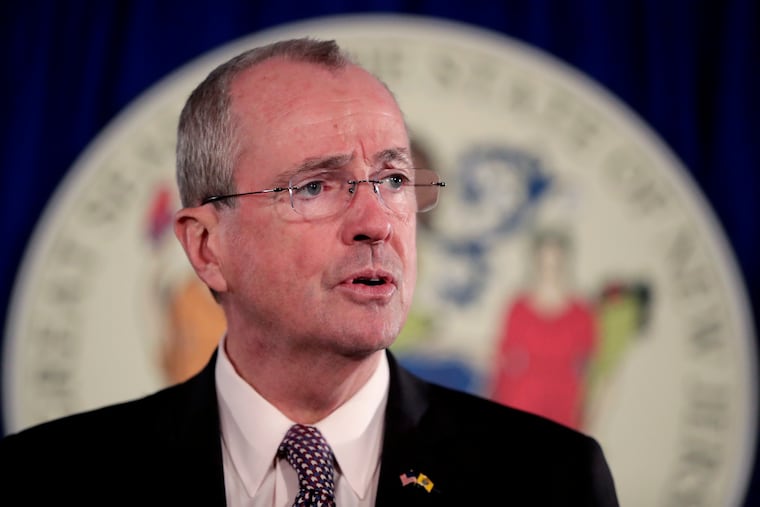Advocates worry: Is Gov. Murphy imposing ‘stealth moratorium’ on N.J. charter schools?
Since Gov. Murphy took over in January, New Jersey appears to be taking a time out on charter schools.

Gov. Murphy wanted a "timeout" for New Jersey charter schools after years of growth under his predecessor, Chris Christie. So far, he appears to be getting it.
State officials received 13 applications for new charter schools during the latest round of submissions. None was approved; the last two rejections came Sept. 28, for schools proposed for Trenton and Jersey City.
The New Jersey Department of Education did not give reasons for the two most recent denials, but said it would provide explanations to the applicants. The other 11 were previously disqualified or rejected.
"We're extremely disappointed," Harold Lee, interim president of the New Jersey Charter Schools Association, said last week. "We're hopeful that this is not a stealth moratorium on charter schools in the state, pushed by anti-charter interests."
About 49,000 students were enrolled in New Jersey charter schools last year — a population that more than doubled during the tenure of Christie, a Republican, beginning in 2010. Fewer than 4 percent of public-school students statewide attend charter schools, and enrollment is concentrated in certain districts. In Camden, more than half of students attend charter schools.
Advocates like Lee say the demand for charter schools hasn't been met, with 35,000 students on waiting lists, according to figures reported by charter schools to the association.
But the publicly funded and independently run schools have been controversial, with questions about whether they divert money from traditional public schools and whether their student bodies are representative of the communities they say they serve.
During his campaign, Murphy, a Democrat, called for a hold on charter school expansion. Earlier this year, the Department of Education said it would review the state's charter program.
The department is planning 11 visits to charter schools and five evening community focus groups as part of a statewide effort to examine the charter law.
"Our goal is to engage as many individuals and organizations as possible," spokesman Mike Yaple said.
Charter advocates expressed concern about the recent denials, which they said the department issued without interviewing the applicants. Department officials say interviews aren't required.
Unlike in Pennsylvania, where local school districts can approve charter schools, in New Jersey only the Department of Education can authorize charters.
This was not the first time the state declined to approve any new charters in an application round: It did so in October 2016, said department spokesman Mike Yaple. In fact, most charter applications aren't approved. Of 180 received by the department since March 2013, 22 have received final approval, he said.
The round of applications in October is for proved charter operators, however, and draws fewer applications than the one in March, said Lee, who worked in the department's Charter Schools Office from 2011 through 2016. "It is my understanding" that in past March rounds, at least one charter was approved, Lee said.
The department earlier this year approved one charter school, to be located in Salem County, but the application was pending before Murphy took office in January.
Nationally, the number of charter schools opening each year has fallen after peaking in 2013, according to the National Association of Charter School Authorizers. But most state education agencies that authorize charters are consistently approving new ones, according to the association.
While Murphy has not announced a moratorium on charters, his transition team recommended a "pause" in new charter approvals.
Steve Baker, a spokesman for the New Jersey Education Association, whose president served on the transition team, said, "We don't have any say" on charter approvals, though "we have supported Gov. Murphy's call for taking time to take a look at New Jersey's charter-school law."
Baker said an evaluation of the law is overdue. "It's almost 25 years old now," he said. "It's definitely time to take a look."
In letters Sept. 28 denying the two applicants, Education Commissioner Lamont Repollet said that "the department is committed to developing a strong pipeline of charter schools in New Jersey and providing a high-quality education for New Jersey students."
Paul Disdier, whose proposed Capital City Charter School in Trenton was denied, said the school's backers were "very disturbed, upset." He said last week he wasn't sure if he would appeal the denial, since he had not learned the reason for it.
“Am I surprised? Not completely,” said Disdier, who works as a senior portfolio manager at a municipal bond firm in Princeton and has supported another charter school, Foundation Academies, in Trenton. “There’s been talk that the governor, the union, has been pushing the governor to review the charter-school system. … Unfortunately, it seems as though it’s politics over education.”